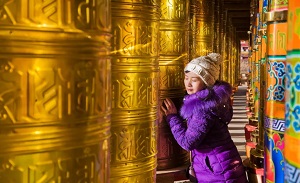Do Buddhists Pray?
 Dictionaries define prayer as a request for help or expression of gratitude directed to God, saints, or other godlike beings. Prayer is the central devotional activity of many religions. Since Buddhism is nontheistic -- meaning gods aren't necessary -- do Buddhists pray?
Dictionaries define prayer as a request for help or expression of gratitude directed to God, saints, or other godlike beings. Prayer is the central devotional activity of many religions. Since Buddhism is nontheistic -- meaning gods aren't necessary -- do Buddhists pray?
And the answer is, no, but yes, and it depends.
Prayer in the dictionary sense is not a formal part of Buddhism, since it is understood there is no powerful 'other' to which prayers are directed. But there are a great many prayer-like activities, such as vows and invocations. And Buddhists also request help and express gratitude all the time. So the first question is, where are these expressions directed?
Gods or No Gods?
There are several kinds of beings in Buddhist scriptures and art who are identified as gods. Many, such as the devas, can be thought of as characters in fables. The devas of scripture live in their own realms and generally don't do anything for humans, so there's no point praying to them even if they were 'real.'
Tantric deities of Vajrayana Buddhism can be understood as archetypes of our own deepest nature, or they may represent some principle, such as the factors of enlightenment. Sometimes prayers are directed to transcendent buddhas and bodhisattvas, who can be understood as archetypes also.
Sometimes laypeople especially do seem to regard iconic figures as separate beings with their own existence, however, even though this understanding is not consistent with other Buddhist teachings. So sometimes people who self-identify as Buddhist do pray, although prayer isn't part of what the historical Buddha's taught.
Read More: Are There Gods in Buddhism?
Buddhist Chanting Liturgy
There are several different types of texts that are chanted as part of Buddhist liturgies, and especially in Mahayana Buddhism the chants often are directed to transcendent buddhas and bodhisattvas. For example, Pure Land Buddhists chant the Nianfo (Chinese) or Nembutsu (Japanese) which invoke the name of Amitabha Buddha. Faith in Amitabha will bring one to rebirth in a Pure Land, a state or place in which enlightenment is easily realized.
Mantras and dharanis are chants valued for their sounds as much as for what they say. These usually brief texts are chanted repeatedly and could be thought of as a kind of meditation with the voice. Often the chants are directed or dedicated to a transcendent buddha or bodhisattva. For example, the Medicine Buddha mantra or longer dharani may be chanted on behalf of someone who is ill.
This begs an obvious question -- if we invoke the name of a buddha or bodhisattva to aid our spiritual quest or heal our friend's sickness, is this not a prayer? Some schools of Buddhism do refer to devotional chanting as a kind of prayer. But even then, it's understood that the purpose of the prayer is not to petition a being' out there' somewhere but to awaken the spiritual strength that is within each of us.
Read More: Chanting in Buddhism
Beads, Flags, Wheels
Buddhists often make use of prayer beads, called 'malas,' as well as prayer flags and prayer wheels. Here is a brief explanation of each.
Using beads to count repetitions of a mantra probably originated in Hinduism but quickly spread to Buddhism and eventually to many other religions.
Hanging prayer flags in mountain winds is a common practice in Tibetan Buddhism that may have originated in an earlier Tibetan religion called Bon. The flags, usually covered with auspicious symbols and mantras, are not intended to carry petitions to gods but to spread blessings and good fortune to all beings.
Prayer wheels, also associated primarily with Tibetan Buddhism, come in many shapes and forms. Wheels are usually covered in written mantras. Buddhists spin the wheels as they focus on the mantra and dedicate the merit of the act to all beings. In this way, the wheel turning is also a kind of meditation.
By Barbara O'Brien
https://www.learnreligions.com/
